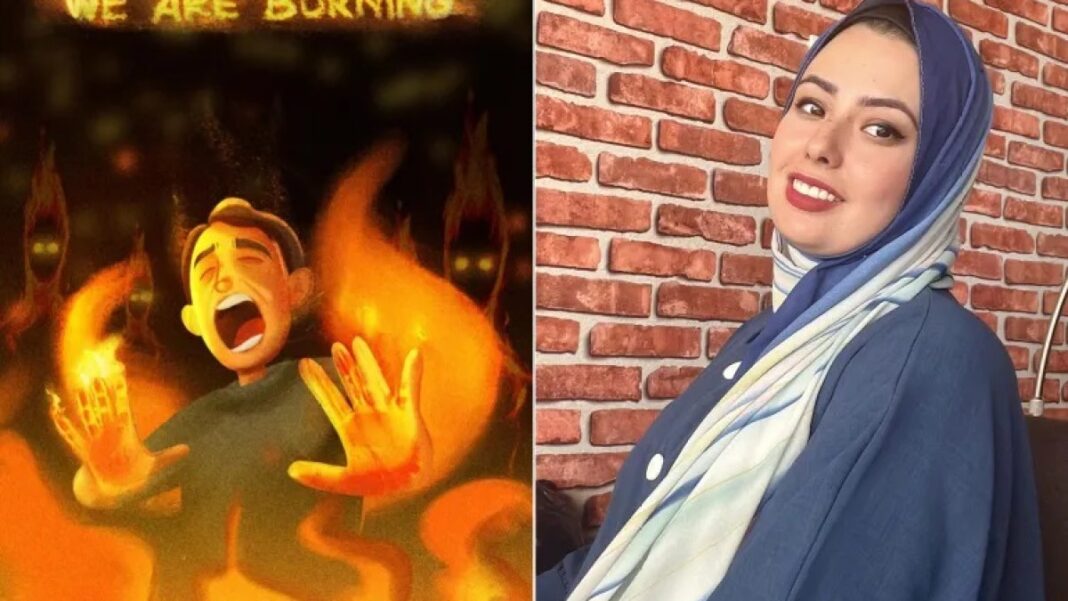Over the past 20-odd years, I have written a series of poems. I have kept them locked away in a folder, dreaming of publishing them accompanied by illustrations that would bring each poem to life. I needed someone to help transform my words into powerful images.
One October evening, earlier this year, I was scrolling through Instagram when I came across a beautiful image of Palestinian journalist Wael Dahdouh embracing his daughter.
It was the work of Mahasen al-Khateeb, one of Gaza’s most prolific artists. One post led to another and I soon found myself pulled deep into her art.
Until that moment, I had never heard of her. But the more time I spent on her page, the more I felt a connection to her simple yet powerful and vibrant drawings. Like most of her followers, I felt the art Mahasen produced struck a chord deep within. I later wondered if it was time to retrieve my old folder and rekindle the almost-forgotten dream of publishing my works. Perhaps Mahasen could illustrate them?
I quickly made a note of her name on my phone and decided to reach out as soon as the war would end, excited by the prospect of collaborating with her.
Just a few days later, on the night of October 18, Israel launched an air strike and killed Mahasen. She is one of tens of artists, designers and documentary filmmakers Israel has killed in the last 14 months. Mahasen was in the north, in Jabalia, where there was no media or ready access to aid groups or food and water.
Every death is a tragedy without measure. Mahasen was killed with her entire family; another 20 people were also slaughtered in Jabalia that same night. But Israeli bombs did not just kill Mahasen; they also killed her art, her aspirations and her hopes – along with those of every single victim who was murdered with her.
Per official statistics, more than 45,000 Palestinian lives have been lost in the ongoing genocide. What this number does not capture is the ripple effect every single death has on the living – on those who loved the victim, who relied on them, who found hope in their being. Reflecting on this reality plunges the mind and heart into a painful rupture.
I did not know Mahasen, but was greatly affected by her death. I can only imagine how those who knew felt.
How many more dreams will perish in this war? How many aspirations, scribbled in the margins of notebooks, jotted down in diaries, or tucked away in a quiet corner of the mind, will be reduced to nothing in an instant? The bombs do not only shatter buildings and refugee camps. They also obliterate dreams.
Dreams of children too young to understand. Dreams of education in schools completely eviscerated. Dreams of jobs and careers. Dreams of travel outside the narrow streets of refugee camps buried under smoke and rubble. Dreams of success of a small business that collapsed in the blink of an eye. Dreams of love and companionship smothered by weddings postponed indefinitely or cancelled forever.
We are painfully aware of all this death. Life in Gaza comes in fragments, brief moments that we try to grasp fully. We do not plan because we do not know if there will be tomorrow.
And yet, we still dream. We draw, write, love, and resist. Every smile we share, every story we tell, every poem we write, is an act of defiance, a declaration that, despite the destruction, life continues to beat in our hearts.
Our dreams are not grand or dangerous. But somehow, they terrify our oppressors. They fear our dreams because we seek freedom and persist against all odds. They fear our dreams because they challenge the status quo. But dreams cannot be suppressed forever, no matter how much blood is spilled.
As I now put my folder of poems back to where I had kept it, a part of me realises the need to seize every moment before it is taken from us by a missile, a shell, or a bullet.
I continue to dream of the day Gaza will transform from a battleground into a destination of beauty, a city that stands tall, having survived annihilation. And with me, all Palestinians continue to dream of breaking free, even when that seems distant and impossible.
The views expressed in this article are the author’s own and do not necessarily reflect Al Jazeera’s editorial stance.


